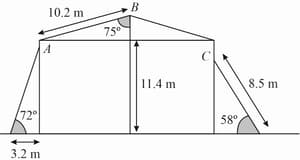Embibe Experts Solutions for Chapter: Some Applications of Trigonometry, Exercise 1: Exercise
Embibe Experts Mathematics Solutions for Exercise - Embibe Experts Solutions for Chapter: Some Applications of Trigonometry, Exercise 1: Exercise
Attempt the practice questions on Chapter 12: Some Applications of Trigonometry, Exercise 1: Exercise with hints and solutions to strengthen your understanding. Mathematics Crash Course (Based on Revised Syllabus-2023) solutions are prepared by Experienced Embibe Experts.
Questions from Embibe Experts Solutions for Chapter: Some Applications of Trigonometry, Exercise 1: Exercise with Hints & Solutions
The angle of depression from the top of a vertical tower to a point on the ground is found to be 60° and from a point 50m above the foot of the tower the angle of depression to the same point is found to be 30⁰ as shown in the figure find the height of the tower.
An aircraft flying parallel to the ground in the sky from the point through the point is observed, the angle of elevation of aircraft at from a point on the level ground is , after seconds it is observed that the angle of elevation of aircraft at is found to be from the same point. Find at what height the aircraft is flying, if the velocity of aircraft is .
(Use )

The angles of elevation of the top of a tower from two points at a distance of from the base of the tower and in the same straight line with it are complementary. If the height of the tower is , then find the value of .
A coast guard attendant atop a cliff high observes two boats in line with him at angles of depression of degrees and degrees. Determine how far apart the boats are.
Find the heights from the ground of and .

A vertical stick long casts a shadow which is long. Determine the altitude of the sun (its angle of elevation).
Gina is flying a kite that makes a angle with the ground. Determine how high the kite is above the ground when she has let out of string.
From an aeroplane vertically above a straight horizontal road, the angles of depression of two consecutive milestones on opposite sides of the aeroplane are observed to be and Show that the height (in miles) of aeroplane above the road is given by .
